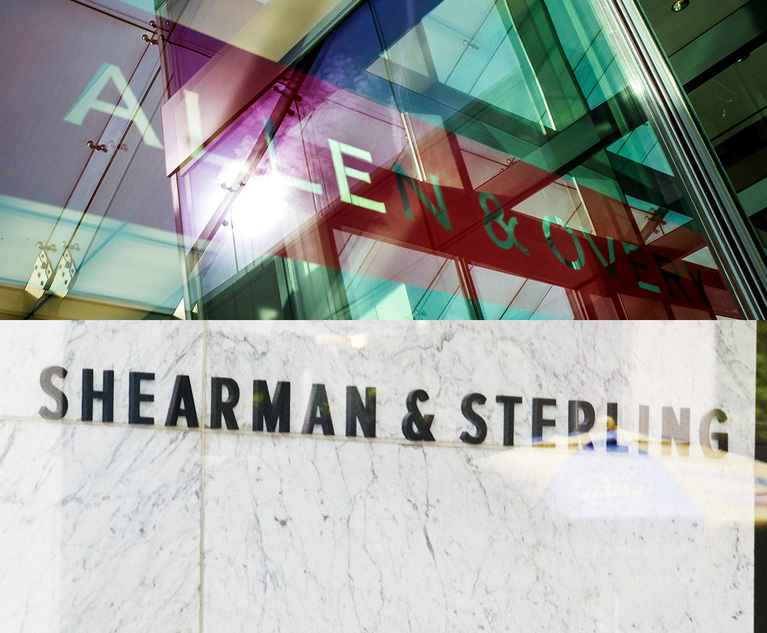 Photos: ALM
Photos: ALM A&O Shearman: The Compelling but Unspoken Rationale
Industry observer Hugh A. Simons dives into historical data and law firm dynamics to explore the true, though perhaps unspoken, benefits of a merger between Allen & Overy and Shearman & Sterling.
August 25, 2023 at 05:00 AM
13 minute read
Allen & Overy and Shearman & Sterling have the same problem. For the past 20 years they've been losing ground to the competition. In 2000, Allen & Overy was ranked sixth by revenue globally and Shearman was ninth. By 2021, Allen & Overy had slipped to 11th and Sherman had fallen to 61st. More worryingly, as it's an indicator of a firm's ability to retain its commercially strongest partners, profits per equity partner (PEP) too has been trending downwards. In 2000 both firms ranked between 10th and 20th globally; in 2021, they ranked between 40th and 50th, see Fig. 1.
The Story Behind the PEP Decline
In 1999, Magic Circle firms Allen & Overy, Clifford Chance, Freshfields and Linklaters ranked between 13th and 17th globally by PEP. Today, they are clumped between 38th and 44th. What happened?
Beginning variously in the 1980s and 1990s, and with the stable, profitable, domestic market offering little room for growth, these elite firms embarked on global expansion. The vast majority of this growth was in continental Europe and, secondarily, Asia. As markets outside of the U.S. and U.K. are lower priced and less profitable, this put a downward drag on firm-average PEP. This, in itself, is not a problem. However, it becomes one if a firm's comp system doesn't adequately reflect the differing practice economics of partners in different markets. Failing to do so undercompensates partners in high-profit markets relative to the worth of their practices.
This content has been archived. It is available through our partners, LexisNexis® and Bloomberg Law.
To view this content, please continue to their sites.
Not a Lexis Subscriber?
Subscribe Now
Not a Bloomberg Law Subscriber?
Subscribe Now
NOT FOR REPRINT
© 2025 ALM Global, LLC, All Rights Reserved. Request academic re-use from www.copyright.com. All other uses, submit a request to [email protected]. For more information visit Asset & Logo Licensing.
You Might Like
View All

'Taking the Best' of Both Firms, Ballard Spahr and Lane Powell Officially Merge
6 minute read

New Year, New Am Law 100: Challenges Await These Newly Merged Law Firms
7 minute readLaw Firms Mentioned
- Clifford Chance
- Eversheds Sutherland
- Freshfields Bruckhaus Deringer
- Hammonds
- Linklaters
- Squire Sanders
- Baker McKenzie
- Squire Patton Boggs
- Simpson Thacher & Bartlett
- Hogan Lovells
- Sullivan & Cromwell LLP
- Latham & Watkins
- Holland & Knight LLP
- Allen & Overy
- Norton Rose Fulbright
- Jackson Lewis P.C.
- Shearman & Sterling LLP
- Ropes & Gray
- DLA Piper
- K&L Gates
- White & Case
Trending Stories
- 1Plaintiff Argues Jury's $22M Punitive Damages Finding Undermines J&J's Talc Trial Win
- 2Bannon's Fraud Trial Delayed One Week as New, 'More Aggressive,' Defense Attorneys Get Ready
- 3'AI-Generated' Case References? This African Law Firm Is Under Investigation
- 4John Deere Annual Meeting Offers Peek Into DEI Strife That Looms for Companies Nationwide
- 5Why Associates in This Growing Legal Market Are Leaving Their Firms
Who Got The Work
J. Brugh Lower of Gibbons has entered an appearance for industrial equipment supplier Devco Corporation in a pending trademark infringement lawsuit. The suit, accusing the defendant of selling knock-off Graco products, was filed Dec. 18 in New Jersey District Court by Rivkin Radler on behalf of Graco Inc. and Graco Minnesota. The case, assigned to U.S. District Judge Zahid N. Quraishi, is 3:24-cv-11294, Graco Inc. et al v. Devco Corporation.
Who Got The Work
Rebecca Maller-Stein and Kent A. Yalowitz of Arnold & Porter Kaye Scholer have entered their appearances for Hanaco Venture Capital and its executives, Lior Prosor and David Frankel, in a pending securities lawsuit. The action, filed on Dec. 24 in New York Southern District Court by Zell, Aron & Co. on behalf of Goldeneye Advisors, accuses the defendants of negligently and fraudulently managing the plaintiff's $1 million investment. The case, assigned to U.S. District Judge Vernon S. Broderick, is 1:24-cv-09918, Goldeneye Advisors, LLC v. Hanaco Venture Capital, Ltd. et al.
Who Got The Work
Attorneys from A&O Shearman has stepped in as defense counsel for Toronto-Dominion Bank and other defendants in a pending securities class action. The suit, filed Dec. 11 in New York Southern District Court by Bleichmar Fonti & Auld, accuses the defendants of concealing the bank's 'pervasive' deficiencies in regards to its compliance with the Bank Secrecy Act and the quality of its anti-money laundering controls. The case, assigned to U.S. District Judge Arun Subramanian, is 1:24-cv-09445, Gonzalez v. The Toronto-Dominion Bank et al.
Who Got The Work
Crown Castle International, a Pennsylvania company providing shared communications infrastructure, has turned to Luke D. Wolf of Gordon Rees Scully Mansukhani to fend off a pending breach-of-contract lawsuit. The court action, filed Nov. 25 in Michigan Eastern District Court by Hooper Hathaway PC on behalf of The Town Residences LLC, accuses Crown Castle of failing to transfer approximately $30,000 in utility payments from T-Mobile in breach of a roof-top lease and assignment agreement. The case, assigned to U.S. District Judge Susan K. Declercq, is 2:24-cv-13131, The Town Residences LLC v. T-Mobile US, Inc. et al.
Who Got The Work
Wilfred P. Coronato and Daniel M. Schwartz of McCarter & English have stepped in as defense counsel to Electrolux Home Products Inc. in a pending product liability lawsuit. The court action, filed Nov. 26 in New York Eastern District Court by Poulos Lopiccolo PC and Nagel Rice LLP on behalf of David Stern, alleges that the defendant's refrigerators’ drawers and shelving repeatedly break and fall apart within months after purchase. The case, assigned to U.S. District Judge Joan M. Azrack, is 2:24-cv-08204, Stern v. Electrolux Home Products, Inc.
Featured Firms
Law Offices of Gary Martin Hays & Associates, P.C.
(470) 294-1674
Law Offices of Mark E. Salomone
(857) 444-6468
Smith & Hassler
(713) 739-1250









